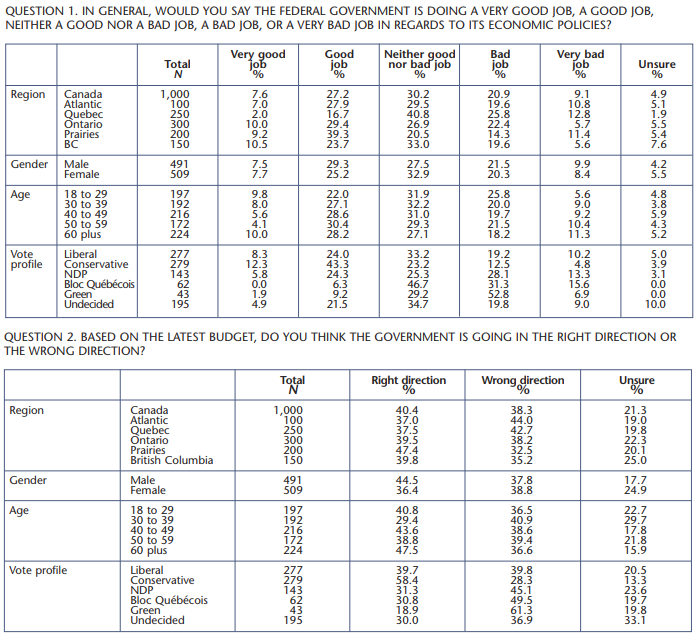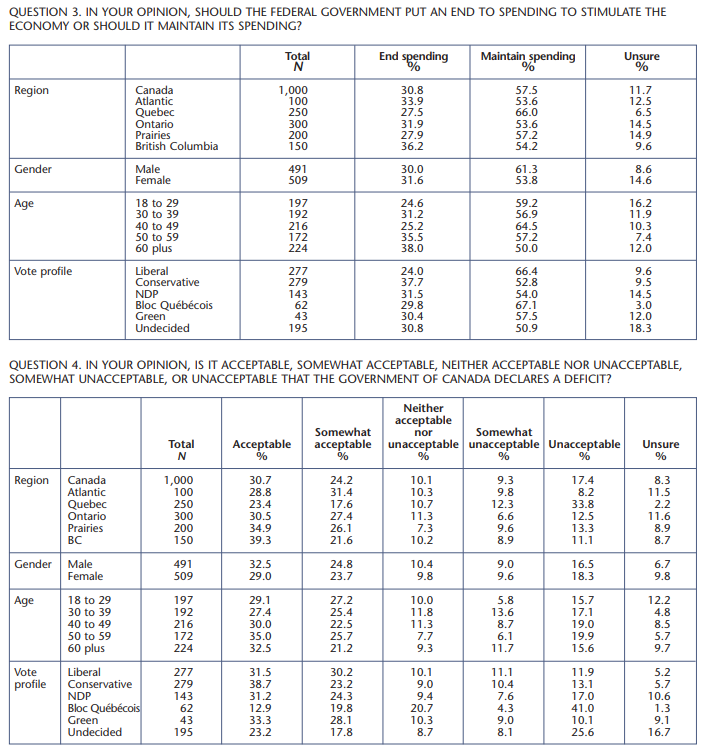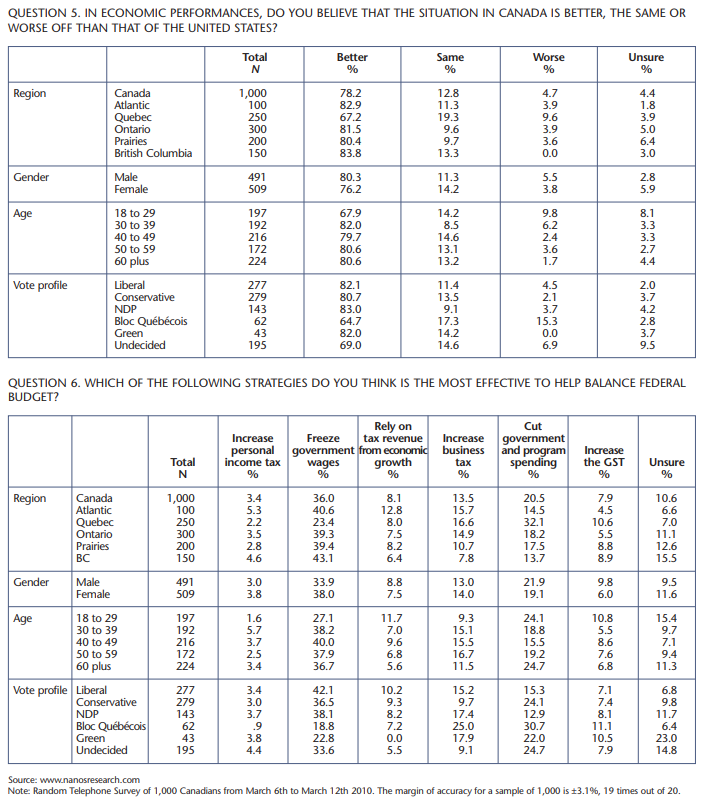
Canadians think deficit spending is acceptable in the present economic circumstances, they want government stimulus to continue, and they support the freeze on government salaries and departmental spending announced in the Throne Speech and Budget 2010.
These are the principal findings of the latest Nanos-Policy Options poll conducted by telephone among 1,000 Canadians from March 6 to 12, 2010 — directly on the heels of Finance Minister Jim Flaherty’s March 4 budget.
The elements of the budget are in sync with what a majority of Canadians want. First, voters put a high premium on stability, and this is a stability budget. Second, while voters want a return to balanced budgets, they are prepared to accept deficits.
This is not, however, a budget that will move the ballot numbers for the Conservative government. If people had a view of the government and the Prime Minister coming into the budget, the research suggests that those views will likely not change. In response to our question of whether Budget 2010 takes the country in the right or wrong direction, Canadians are narrowly divided, and largely along the lines of voting intention. While 40.4 percent of Canadians thought the government was going in the right direction with this budget, another 38.3 percent thought it was going in the wrong direction.
And on the larger question of whether the government was doing a very good (7.6 percent) or good job (27.2 percent) in its economic policies, the positive score was 34.8 percent. But another 30 percent thought the Conservatives were doing a bad job (20.9 percent) or a very bad job (9.1 percent) of managing the economy. A further 30.2 percent thought the government was doing neither a good nor bad job, while 4.9 percent were unsure.
Yet when we tested the basic elements of the budget it resonated with Canadians — there is strong support for reducing the deficit over the medium term, for not balancing the books on the backs of taxpayers, and for continuing government stimulus.
And some specifics of the budget — the federal salary freeze for parliamentarians and the focus on the spending of government departments — win high approval from voters.
Thus, while it may be easy for opposition parties to vote against this budget, it would not be easy to run against it in an election, which may be one more reason for the Liberals not to force one.
For example, 54.9 percent of Canadians say it is acceptable (30.7 percent) or somewhat acceptable (24.2 percent) to run a deficit in the current economic context, while only 26.7 percent think it is unacceptable (17.4 percent) or somewhat unacceptable (9.3 percent). In other words, by a margin of 21, Canadians think a deficit is an acceptable outcome.
Furthermore, Canadians don’t want to exit stimulus spending. Over one half of respondents (57.5 percent) think the government should maintain stimulus spending, while 30.8 percent want it to end it. Another 11.7 percent were unsure. Again, by a margin of nearly 2-1, Canadians support the continuation of stimulus programs.
And when we drilled down into the specifics of the budget, Canadians were very clear on how it should be balanced — not out of their pockets. In other words, balance the budget without us paying for it.
The freeze of government wages, while largely symbolic among MPs and senators, is a highly popular measure — the most popular in the budget, with 36 percent of respondents choosing it as the most effective step toward balancing the budget. Another 20.5 percent chose cuts to departmental and program spending. A further 13.5 percent favoured increases to business taxes, while 8.1 percent thought the government could rely on growth of the economy to throw off new revenues. Only 7.9 percent thought increasing the GST would be the most effective means, while just 3.4 percent favoured a personal tax increase. Fewer than one Canadian in 20 supports a personal tax increase to balance the budget.
So when you drill down from a public opinion perspective, the budget’s “stay the course” approach is elements aligned with Canadians.
Canadians are also well aware that they have come out of the Great Recession, the steepest in more than 60 years, in much better shape than the United States. Fully 78.2 percent of respondents, nearly four Canadians in five, think the situation in Canada is better than that in the US. Another 12.8 percent think it is the same, while only 4.7 percent think it is worse.
Overall, while there is no political bounce for the government in the budget, the attitudinals on the specific initiatives are generally positive.
A final observation along these lines — the longer the present government remains in office, if the economy grows, the greater the likelihood that Stephen Harper and the Conservatives will be seen as solid stewards of the economy.
With an electorate influenced by pocket book issues, competence may trump popularity as a key political factor heading into the next federal election.
Photo: Shutterstock












